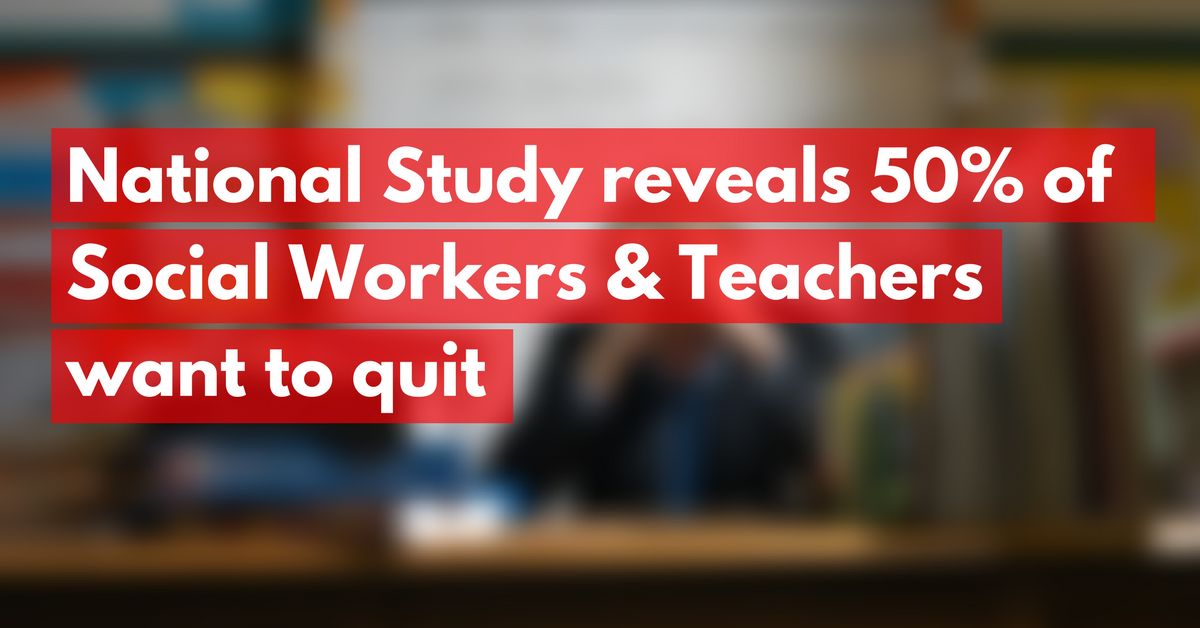Connecting linkedin

Remedy News | 50% of UK Social Worker & Teachers say they want to quit their jobs
A recent study has found that around half the teachers and social workers within the UK want to quit their jobs in the next 18 months due to poor working conditions and the stress their professions are under.
Whilst low pay has always been an issue for the two professions, the national poll of 16,000 found most people cited spending cuts and high workloads as the bigger reasons for quitting.
The author of the research, Dr Jermaine Ravalier of Bath Spa University, described the situation as ‘near crises’ and that social workers often had caseloads that were ‘unimaginable’. This combined with the lack of support staff leaves teachers facing ever increasing administrative tasks with unsuitable preparation time.
It is common for both groups to often work far beyond their contracted hours, an average of 10 hours per week more for social workers and over 18 hours per week for teachers in fact, and it seems this reliance on the goodwill of these workers are being pushed to breaking point.
When looking at the current staffing figures, if only half those who have warned they will leave follow through with the action, the public sector would be left a ghost town, with an exodus of staff on a scale unheard of in the UK.
Not only would this be hugely expensive, but it would also have huge impacts on the next generation as well as those who require the support of our social services in everyday life.
It is extremely important to not overlook the importance the role of social workers and teachers play in society, meaning such negative findings should cause great concern and reason for change.
A Department for Education spokeswoman said: “Latest statistics show that around 90% of teachers continue in the profession following their first year of teaching – this has been the case since 1996.
The number of former teachers coming back to the classroom has also risen significantly, from 13,090 in 2011 to 14,200 in 2016. We are actively addressing the issues that teachers cite as reasons for leaving the profession, for example by supporting schools to reduce unnecessary workload.
“We are supporting the recruitment and training of social workers, investing over £800 million in bursaries and training programme’s, such as Frontline and Step Up to Social Work.
“We are also creating practice-based career pathways to enable social workers to progress without losing touch with the front line.”
While the social work standing on the edge of a staffing crises, there has been some surprising movement towards further cutting the chances of a future social work workforce after Durham University have been considering the scrap of two of its social work courses.
The University has deferred making a final decision on the contentious proposal. A review led by Professor Tim Clark, the Universities pro-vice-chancellor for social sciences and health, has proposed closing the courses due to questions being raised over their long term viability.
The University has stated “A considered approach is being taken to a number of points that have emerged from the consultation,” a spokesperson said. “These will be presented to the School of Applied Social Sciences at the end of this term.”
The spokesperson added that applications for both courses are being taken for autumn 2018.
The delay follows weeks of anger at the plans from both within the university and externally. A letter from staff involved in delivering the courses expressed ‘dismay’ over the potential closures. Jon Bryan, regional support official for the University and College Union (UCU), which has also opposed the proposals, said he welcomed the university’s further consideration of the issue.
“External stakeholders and various pressure groups across the region clearly voiced their concerns and this has been listened to,” he said. “We said at the time that the courses are well-known and highly thought of in the sector, and those who graduate value what they achieve, and our view on that has not changed.”
